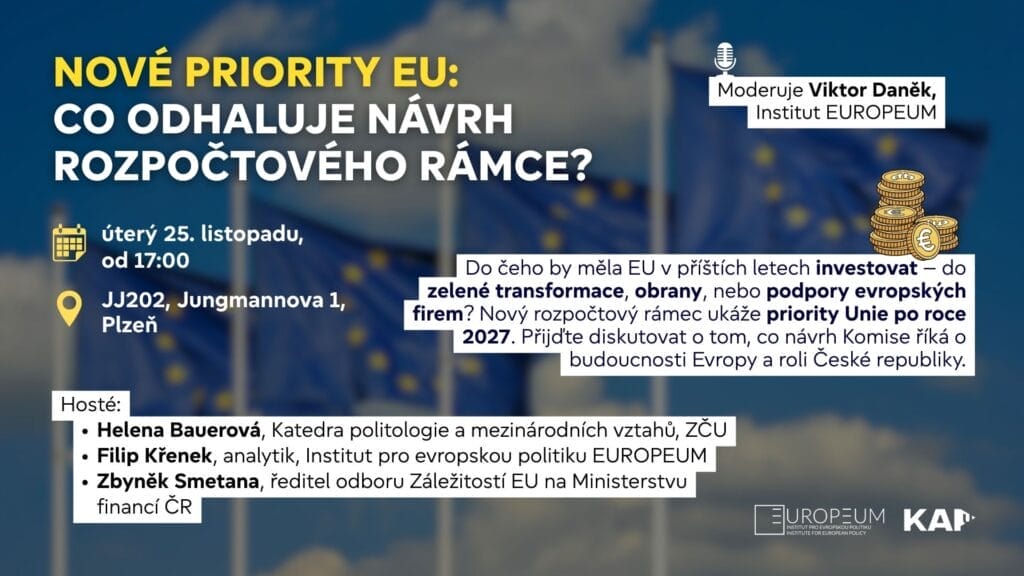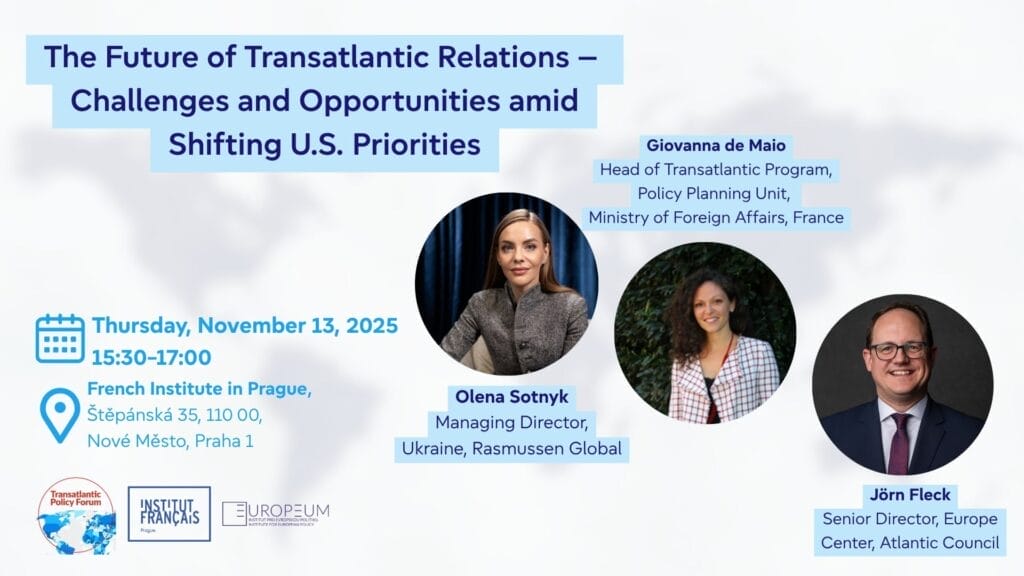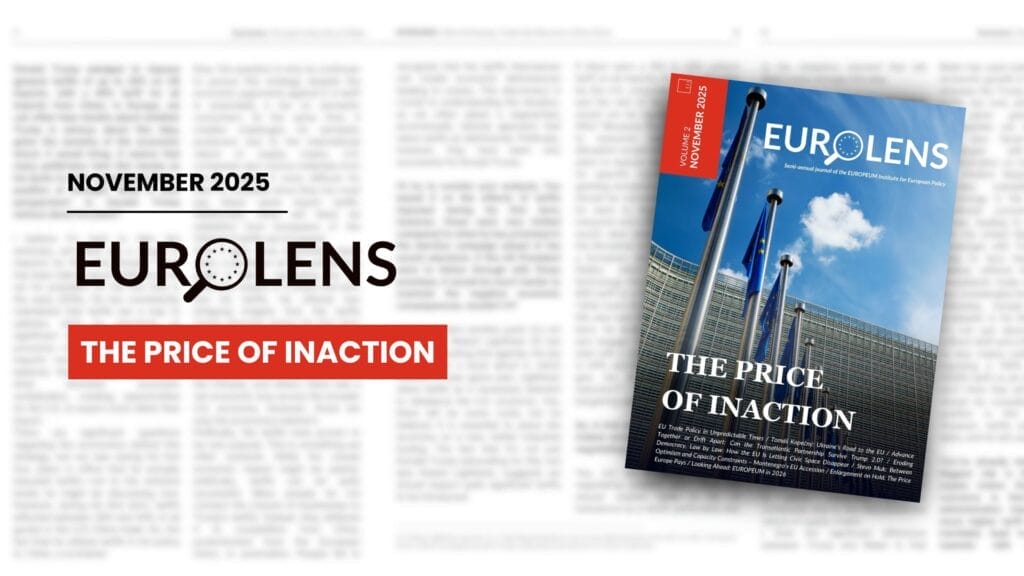
New EU Priorities: What Does the Proposed Budgetary Framework Reveal?
More info 25. 11. 2025
25. 11. 2025
We invite you to a debate in Plzeň on what the EU’s new budget proposal reveals about the Union’s future priorities and the role the Czech Republic may play in them.

Cinema Europa: Drenched in Oil | Screening with Discussion
More info 25. 11. 2025
25. 11. 2025
We cordially invite you to the screening of the film Drenched in Oil (2022), which will be followed by a discussion with our guests.

Policy Paper | Enforcement of the EU Regulation on Forced Labour and Systemic Risks of Forced Labour in Xinjiang
More info 21. 11. 2025
21. 11. 2025
Na konci listopadu 2024 učinil Evropský parlament významný krok, když přijal nařízení 2024/3015, které zakazuje uvádění výrobků vyrobených za použití nucené práce na trh EU. Tento zákaz, jenž vstoupí v platnost v prosinci 2027, se vztahuje na celý dodavatelský řetězec. Vymáhání nařízení bude probíhat prostřednictvím vnitrostátních orgánů členských států a Evropské komise v případech mimo území EU.
Ačkoli má opatření globální rozsah, čelí celé řadě výzev – zejména v souvislosti se Sin-ťiangem. Praktiky nucené práce v tomto regionu byly opakovaně zdokumentovány a potvrzeny jak Mezinárodní organizací práce (ILO), tak Organizací spojených národů (OSN). Zároveň je Sin-ťiang klíčovým dodavatelem solárních panelů, kritických surovin, hliníku, PVC a bavlny, přičemž nucená práce zde často probíhá formou státem organizované mobilizace mimo detenční zařízení, což její odhalení výrazně ztěžuje.
Jak upozorňuje Jan Švec, výzkumný pracovník Ústavu mezinárodních vztahů v Praze, prosazování tohoto nařízení bude představovat jeden z nejsložitějších úkolů obchodní politiky EU.

Policy Brief | Cleavage Formation in the European Parliament and the Implications for EU Politics and the Democratic Deficit
More info 21. 11. 2025
21. 11. 2025
In 2009, Liesbet Hooghe and Gary Marks argued that public opinion in the European Union had shifted from permissive consensus to constraining dissensus, giving mass politics a stronger role in integration than traditional theories assumed. This sparked debate about the EU’s democratic deficit – a contested concept, but one with real political effects. The gap between citizens and EU institutions has long been visible in European Parliament elections, traditionally seen as “second-order” contests with low turnout and protest voting. However, the 2019 and especially the 2024 elections broke with this pattern: turnout increased, EU issues became more politicised, and party positions more polarised. These shifts suggest that a new transnational cleavage is emerging, marking a turning point for democratic engagement in the EU, writes Csaba Stefán, a Research Fellow at the Hungarian Institute of International Affairs, in his policy brief.

Europa Cinema: Generation Euromajdan | Screening and Debate
More info 18. 11. 2025
18. 11. 2025
A film crew has been following Mustafa Nayyem, Svitlana Zalishchuk, and Serhiy Leshchenko since 2013, documenting their fight for democracy in Ukraine. Over the years captured on film, they underwent a major shift in their roles, moving from activism into high-level politics.

Public Recording of the Café Evropa Podcast: Europe, my homeland
More info 17. 11. 2025
17. 11. 2025
We would like to invite you to a public recording of the Café Evropa podcast. This time we'll talk about what modern patriotism looks like today and how citizens’ relationship with their own country is changing in a globalized world.

Report | Multiannual Financial Framework (MFF) - Challenges and Opportunities
More info 17. 11. 2025
17. 11. 2025
Multiannual Financial Framework (MFF) – Challenges and Opportunities, co-organized on November 17th, 2025, by the Brussels Office of the EUROPEUM Institute, the International Visegrad Fund, and the Slovak Permanent Representation to the EU, opened with reflections on 17 November—a symbolic date for Central Europe marking the pursuit of freedom, democracy, and systemic transformation. The conference brought together policymakers and experts to discuss the key strategic priorities of the forthcoming Multiannual Financial Framework (MFF) 2028–2034. The event offered an in-depth examination of issues including competitiveness, cohesion policy, innovation, and funding for science. It also underscored the importance of the EU budget in supporting Ukraine’s recovery and integration.

The Future of Transatlantic Relations - Challenges and Opportunities amid Shifting U.S. Priorities
More info 13. 11. 2025
13. 11. 2025
The EUROPEUM Institute for European Policy invites you to a public discussion on the future of transatlantic relations and Europe’s role in a rapidly changing global environment. Join us as leading experts explore how shifting U.S. priorities are reshaping cooperation and what this means for Europe, including Central and Eastern European partners.

EuroLens Journal #2: The Price of Inaction
More info 13. 11. 2025
13. 11. 2025
And here it is – the second edition of our EuroLens journal! Building on the success of the first issue, this new edition once again offers interviews with experts, commentaries, and articles on both political and non-political topics. You will also find an overview of upcoming events, conferences, and much more. We hope it will serve as an interesting and inspiring source of information and support your work.

An ambitious EU: How to finance the budget? What’s new in the European Parliament?
More info 12. 11. 2025
12. 11. 2025
We invite you to another debate in our series, offering an up-to-date perspective on key topics discussed during the plenary sessions of the European Parliament.

Policy Paper | Advancing Together or Drifting Apart? Reassessing the Transatlantic Partnership in a New Global Order
More info 7. 11. 2025
7. 11. 2025
The transatlantic relationship is entering a pivotal moment. With the United States turning inward, global rivalries intensifying, and trust across the Atlantic under strain, Europe faces growing pressure to rethink its approach to security, energy, and technology. This paper explores where transatlantic cooperation continues to thrive, where it is weakening, and how Europe can translate strategic ambition into tangible action—before the next crisis tests the resilience of the alliance. An insightful read for anyone engaged in global policy and transatlantic affairs.